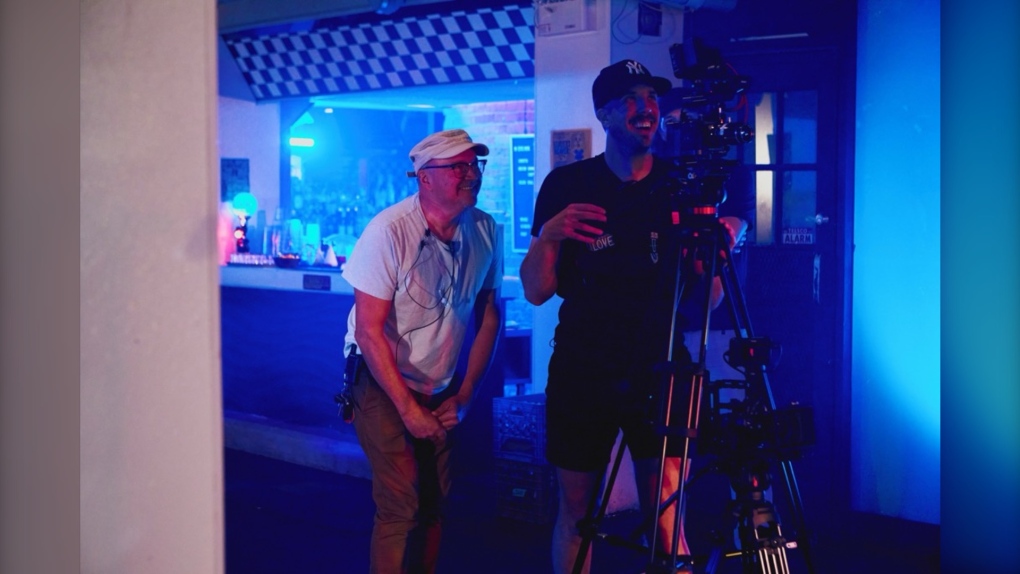Everybody who lived in Edmonton in the 1980s knew it was famous for two things: the mall and the Oilers.
What filmmaker and journalist Peter Hays explores in his documentary Flashback, which screens Saturday as part of the Calgary Underground Film Festival (CUFF) is a third thing, namely a dance club that was a safe haven for queer people and their friends.
“We (Edmonton) had the world’s largest shopping mall,” said Hays, in an interview with CTV News. “We had the world’s best hockey team – and we had Flashback.
“And I would put them on the same level – and I know there’s some hockey fans who won’t be happy to hear that but the truth is – and I’m a hockey fan too – but the truth is, it changed the culture of Edmonton.”
The inspiration for Flashback was Hays’ younger brother Matthew, a journalist and author who teaches film in Montreal and has written for the Globe & Mail, the Guardian and many other publications around the world.
Matthew co-wrote Flashback with Peter and reminisced about the club, which played a huge role in his queer youth coming of age in a province where homophobia was routine and relentless, in a recent online article.
“While it was not a utopia, it allowed queer people a crucial space of resistance,” he adds. “The documentary Flashback is an ode to that spirit of resistance and resilience.”
“As queer youth, we had been told repeatedly that our lives would be miserable and not worth living. We did what many queer people do when faced with that message: we got up and danced,” Matthew writes.
The film features interviews with people who were part of the club’s scene in the ’70s and ’80s and early years of the ’90s – it shut down in 1991 – including playwright Brad Faser, whose breakthrough play, Unidentified Human Remains and the True Nature of Love, has scenes set in Flashback and Darrin Hagen, who created a queer theatre company, Guys in Disguise that was born out of doing drag shows at Flashback.
‘A ghost’
The challenge for director Hays, who received funding from TELUS Originals, was how do you show the story of a nightclub that’s been out of business for 33 years, which existed before smartphones and social media — a place where people had to avoid being seen at the risk of losing jobs and sometimes relationships?
“Flashback’s a ghost – it shut in 1991-92,” Peter said, “and so we had a concern about how are we going to tell this story in a film where you have to show and tell the story?
“We knew we had some people who could tell the story and we started doing interviews and that piece, but then we needed to illustrate the story.”
That’s when the filmmaker discovered that the original neon sign still existed.
“We tracked down the sign,” he says, “and at the beginning of the film, we go and find the sign and then in the middle of the film, the sign is restored and then at the end of the film – I’m sorry to give it away – but the sign is put up on the side of a building as part of the Edmonton Neon Sign Museum and literally shines its light on the original 104 Street location which was the main location of Flashback.”
The original Flashback neon sign is now part of the Edmonton Neon Sign Museum, which is across the street from the original club.(Photo: Peter Hays)
Garneau Cinema
The film has been screened at a number of film festivals and most recently, Hays was in Las Vegas trying to sell it down in the U.S.
It’s all an outgrowth of TELUS Originals, a fund designed to help Alberta and B.C. filmmakers tell local stories that have universal appeal.
And while Peter has lived in Calgary for many years, working as a filmmaker and journalist, he was thrilled the first time Flashback received a public screening.
“We showed the film first publicly at the Metro Cinema, which was the old Garneau Cinema in Edmonton,” he said, “which is across the street from Garneau Junior High — which is my junior high school!
“We used to go to that theatre – my family would go and watch movies in the ’70s and now we get to show our film at the Garneau Cinema – that was a trip.
“That was just so rewarding.”
Three or four decades ago, Flashback was known as the Studio 54 of the prairies, Hays says.
“It had the black and white checkerboard floor and it had this reputation in the club scene,” he said. “If you were in the club scene in New York or in San Francisc and you mentioned Flashback, they knew what that was.”
 Director Peter Hays (L) recreating a scene for his docmentary film Flashback. (Photo: Peter Hays)
Director Peter Hays (L) recreating a scene for his docmentary film Flashback. (Photo: Peter Hays)
“It was a big space and it had great sound and it had a little record store inside it. It was really a serious venue, it was a cool place to go.”
As far as getting a hometown screening at CUFF, Hays says that’s perfect.
“Flashback was an underground club,” he says. “And so for us to be a part of an underground film festival is really appropriate.”
Flashback screens as part of CUFF at 4:45 p.m. Saturday at the Globe Cinema. For more information about Flashback, go here.
For more information about CUFF, go here.

